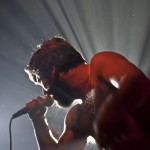I thought it was about time that I share some of my impression about concert photography. I am asked quite often about it, so here’s how I perceive concert photography and everything around it. It’s going to be a looooooong post.
I see myself as very lucky to be able to shoot concerts. Photography and music are two passions of mine and combining both is like a dream come true.
Since I’ve been photographing concerts I have that “rule” that I also photograph the support act. There’s quite a few reasons for that. One being that for me it’s a sign of respect towards the band, you will see that more often than not they’re very good performers and you’ll end up enjoying yourself shooting their show. And then I think it’s a good way to “warm up” for the shoot to come. You get a feeling about the light for the show (although it may and will probably vary from the support act to the main act), you can spot details that could be problems or that could lead to better pictures. Seriousely, worst case scenario … the band sucks you discard the images and that’s it. At least you had some practice.
 Another interesting part of it is that every concert is different and you learn new things every time. You can’t be 100% prepared, improvisation is part of the game here. If the picture “works” it doesn’t matter how you got it, as long as you respect the rules. Then there’s the rush, you’ve got 3 songs (sometimes even less) to take your pictures. As you can imagine, the situation in regards to light is less than ideal. Basically you have to work fast, … very fast. I usually end up with 100 to 120 pictures in those +-12minutes. I have to produce approximatively 20 pictures for the publication.
Another interesting part of it is that every concert is different and you learn new things every time. You can’t be 100% prepared, improvisation is part of the game here. If the picture “works” it doesn’t matter how you got it, as long as you respect the rules. Then there’s the rush, you’ve got 3 songs (sometimes even less) to take your pictures. As you can imagine, the situation in regards to light is less than ideal. Basically you have to work fast, … very fast. I usually end up with 100 to 120 pictures in those +-12minutes. I have to produce approximatively 20 pictures for the publication.
My post processing on the first few concerts was quite intense, as I was used to portrait photography. I ended spending behind the screen after the concerts. I’ve completely stopped that. Sometimes I crop some of the pictures or adjust the white balance but that’s basically it.
I see some concert photographers out there who publish some pictures that are not in focus or the composition is really off. I have become very careful about that, if the picture is technically not ok I will not publish it. Exceptions are pictures that I wanted to look a specific way, which points to the fact that even concert photography is still an art. We should all strive to still remain creative even though the timeframe is very small.
Well, I guess that’s it, …. I hope that the post will give people some answers they were looking for.
Cheers,
Tom


Leave a Reply